In the Netherlands, a troubling pattern has emerged regarding sperm donation, unveiling that numerous men have unwittingly fathered an unusually large number of children. Recent findings indicate that a single donor has been connected to as many as 125 offspring, raising critical questions about genetic diversity and public health.
The alarming statistics stem from a newly established national registry designed to monitor sperm donations across the country. Released earlier this week, the data identified at least 85 individuals classified as mass donors – men who have produced more than 25 identifiable descendants through artificial insemination. This revelation suggests that children born from donor sperm may have a more significant number of half-siblings than previously acknowledged by Dutch authorities, prompting worries about the consequences of consanguinity and associated genetic risks as these children grow up and start their own families.
In a letter to the Dutch Parliament, Vincent Karremans, the minister of youth, prevention and sport, addressed concerns regarding inadequate oversight and poor record-keeping practices within fertility clinics. This lack of regulation has led to mass donations occurring without the donors' knowledge or consent. As a result of these findings, a new law, implemented on April 1, mandates stricter monitoring of how sperm donations are utilized and tracked.
“I deeply regret that these excesses have been discovered,” Minister Karremans expressed, showing empathy for the parents who sought fertility treatments and may now be faced with the reality of having children with numerous half-siblings. The situation has sparked widespread discussion on the ethical responsibilities of fertility clinics and the necessity for enhanced regulatory frameworks to prevent similar occurrences in the future.




















